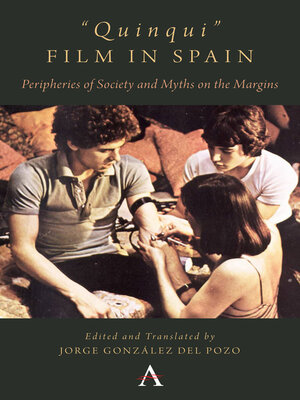"Quinqui" Film in Spain
ebook ∣ Peripheries of Society and Myths on the Margins
By Jorge González del Pozo

Sign up to save your library
With an OverDrive account, you can save your favorite libraries for at-a-glance information about availability. Find out more about OverDrive accounts.
Find this title in Libby, the library reading app by OverDrive.



Search for a digital library with this title
Title found at these libraries:
| Library Name | Distance |
|---|---|
| Loading... |
This volume of essays focuses on films of the so-called quinqui genre, films created during the 1970s–1980s depicting the lives of young criminals from the outskirts of Spanish cities, that arose/spread during the uncertain transitional period in a Spain moving from a dictatorship to a democracy. The quinqui films, produced and released on a shoestring budget, were nonetheless immensely popular, although never fully considered as part of the national film production in academic circles due to their "B" nature and low quality. These films encapsulate many of the concerns that Spaniards were facing (unemployment, class conflict and disparity, wild economic growth, increasing violence and crime activity, illegal drugs ravaging the youth, etc.) and consequently they had an impact on social, cultural, and emotional levels in the reborn country. In addition to recent interest in these films as cultural products, this book presents a thorough and multi-perspective analysis of the implications for film and society that these films reveal, clarifying both: the Spanish filmic panorama as well as the canon, and the socio-political situation in a country that was going through one of the most controversial and tumultuous times of its contemporary history.
|The recent interest in quinqui film and the uprooted people of the Transition who were relegated to the background or were forgotten has recovered throughout the twenty-first century. The dissemination of the subgenre, paraphernalia and fetishism that surrounds these films, as well as the social groups they represented, have had their maximum exponent in exhibitions around the time that they were displayed in Madrid and Barcelona. During the summer of 2010, specifically from May 25 to September 6, the exhibition "Quinquis de los 80. Cine, prensa y calle" took place at the CCCB (Center for Contemporary Culture of Barcelona). Echoing this interest and practically simultaneously (from July 9 to August 29), the cultural center La Casa Encendida of Madrid held an exhibition and numerous screenings of Quinqui movies from the 70s and 80s. Both exhibitions enjoyed a great reception and affluent visits, as well as publicity and repercussion in different media, highlighting the large number of press releases published and the multiple reports that were broadcast during the television news shows of the main networks in primetime. Recently, films made with retro aesthetics in remembrance of that era have been released on the big screen, as is the case of revisions such as 7 vírgenes by Alberto Rodríguez (2005), Volando voy by Miguel Albadalejo (2006) or El idioma imposible by Rodrigo Rodero (2010). This last film is based on the homonymous novel by Francisco Casavella that is part of his particular vision of the years of the Transition through the trilogy "El día del Watussi". In turn, renowned authors integrated into the literary star system of large circulation have published texts that portray this era and these young delinquents, slum dwellers and outcasts that are somewhere between the extreme hedonism of the heroine, the constant escape on board a Seat miriafiori or a Bultaco and survival in the peripheral neighborhoods...







